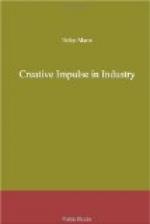This conclusion is fatalistic, but it is a brave one. It does not fall back on weak substitutes for reality; it does not throw the glamor of history and the aesthetics of industry around trades with the poor hope that they make up for the content which is not there; it does not foster the assumption that training in technique of industry or physical science can enrich, under the circumstances, the worker’s experience to any important extent. It accepts the bald truth that all the material classed as cultural will count for nothing of value in a factory worker’s life in comparison with the highest possible wage in the most enervating of industries. It stresses this highly important factor, as it should, but merely as a physical necessity. There is vital education in the consciousness of self-support, in the consciousness that one is earning the living one gets. But under present conditions the educational experience of wage recompense is not so significant as it might be if it measured the value of the labor performed; if it paid the worker according to his needs, and if he gave in return for the wage according to his ability.
The Gary school system is a notable effort in public school education to fulfill children’s desire for productive experience. It is in striking contrast to the German scheme as it is based on processes which have educational force and significance. In saying this I differentiate between training for industry and participation in the industrial activity which is an organic part of the life of the children and of the community. The children are an actual part of the repair and construction working force on Gary school buildings and on the equipment. As the children are involved in the upkeep of a school it becomes their school. They experience the responsibility of maintaining the school plant, not by some artificial scheme of participation, but by the actual application of trade standards and acquired technique to operations which have for them and those with whom they live important significance. They gain in their work a first hand knowledge of industrial processes and activity. In conjunction with skilled mechanics they work on the carpentry, the plumbing, the masonry, the installation of electricity used in the school building. They do the school printing and accounting.
The children’s life in these schools is an experience in industry where there is nothing to hide, no trade secrets to keep back. The children have the full opportunity of seeing their work through to its completion and understanding its purpose and recognising its value and use. It provides more than any other school system a liberal field for productive endeavor. But the Gary schools are not industry; they are a world apart; they represent, as all schools are supposed to, moments sacred to education and growth. They are not subjected to the test of cooerdination in the world of industry. They give the children




